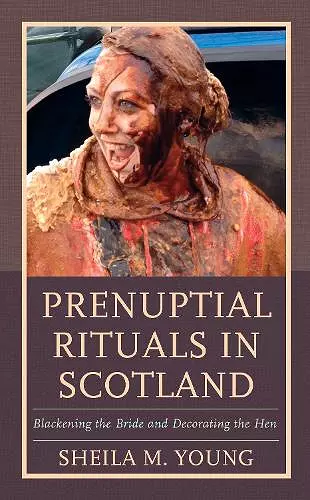Prenuptial Rituals in Scotland
Blackening the Bride and Decorating the Hen
Format:Hardback
Publisher:Bloomsbury Publishing PLC
Published:11th Oct '19
Currently unavailable, and unfortunately no date known when it will be back

The hen (or bachelorette) party, with its groups of visible, raucous women on trains, planes, and in public spaces is ubiquitous throughout the English-speaking world. The practice of the blackening, a unique form of kidnapping and “punishment” ritual, is limited to North Eastern parts of Scotland and to specific sectors of the population. Both are prenuptial rituals enacted by women. In Prenuptial Rituals in Scotland, Sheila Young produces a thorough description of how these two rituals were and are enacted and analyzes the ways these practices have changed through time as a social commentary. Young’s study provides valuable insights into identity, gender, social class, contemporary attitudes to ritual, and what it means to approach marriage in the twenty first century.
Prenuptial Rituals in Scotland is a very welcome addition to the study of marriage traditions and the discussion illustrates generational change in weddings across a period of sixty-plus years, a period of rapid and large societal changes in lifestyle, working practices, and family dynamics. Sheila Young should be congratulated for carrying through this study and surviving as a participant in some of these events. * Folklore *
This fascinating book offers detailed accounts of two Scottish rites of passage associated with weddings. One, the hen party, is familiar to most in the United Kingdom and many outside it. The other, the blackening, which primarily involves pouring disgusting substances over the bride and/or groom, may be unknown even to substantial numbers of Scots. As the latter’s terminology suggests, participants are pretty exclusively White. But they’re also mainly heterosexual, cisgender, and cissex. Those who take part in hen parties need sufficient economic capital in the form of income or credit but those involved with the blackening must have a particular kind of cultural capital that comes from insiderhood in specific local communities.
Combining ordeals and hazing with expressions of love and community support, these edgy events require social and economic investment. And the possibilities for spectacular failure—from disappointment and hurt feelings to physical violence—clearly show that the alibi that these customs are fun doesn’t tell the whole story. There are implications for gender, sex, sexuality, class, religion, and nation. Interpreted by participants as both positive and negative experiences, the raucous, sexualized, and obnoxious elements of these transitional rituals demonstrate the ambivalence that characterizes life partnering in Scottish cultures today.
With this book, Sheila Young has produced a skilled examination of the form and meaning of the historical blackening of the bride and the contemporary hen party. This richly described and multifaceted account brings to bear an impressive range of scholarly theorizing from across anthropology, sociology, cultural studies, and social history on these prenuptial rituals, and expertly decodes how games, costumes, food, and no small amount of booze are put to work in the rites and rituals through which family, friendship, and gender are enacted with never less than fascinating results. -- Thomas Thurnell-Read, Loughborough University
ISBN: 9781793603869
Dimensions: 227mm x 160mm x 20mm
Weight: 540g
220 pages